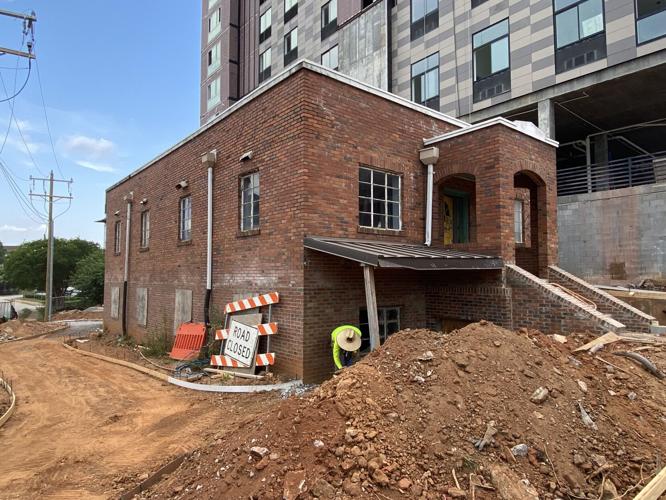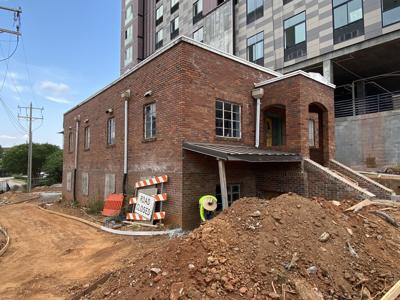GREENVILLE — Wide patches in the ceiling reveal the support beams underneath. The observation rooms have fallen into disrepair. The windows are shattered and boarded up.
The building's current condition belies its past as a premier medical facility that served Greenville's Black community when its residents couldn't find care anywhere else.
Dr. Edward McClaren invested $15,000 of his own money to construct the brick building on Wardlaw Street in 1948 and open his medical office. The space filled an urgent need after the county shut down the Working Benevolent Society Hospital where McClaren worked while the area's major hospitals refused to take Black patients.
It was a haven and beacon of Black excellence in the age of Jim Crow, said Urban League of the Upstate CEO Gail Wilson Awan.
In the decades since the squat building, now dwarfed by an emerging residential development, stopped functioning as a doctor's office it's housed a barbershop, hair salon, spa and art gallery. Those were way-stops, Awan said, on its way back to being a health resource for people in need.
The developers who own the land the McClaren Medical Shelter sits on and who are building the complex behind it are deeding the building to the Urban League, which plans to use it as an access point for Greenville residents seeking medical care.
"A historic civil rights organization that's been around for a hundred years is the organization that is moving in and making sure that Dr. McClaren's legacy of caring for the health of people of color, African Americans and other underserved folks lives on," Awan said.
The top floor of the two-story building will serve as the McClaren Institute for Health and Quality of Life, a nexus for the various health services the Urban League offers and partners with throughout the Upstate, including training programs for young people who want to work in the health care industry and screenings for prostate cancer.
The bottom level will house a community room, as well as a museum of sorts honoring the life and work of Dr. McClaren.
When the plan to officially transfer ownership of the building from New York-based developer Lighthouse Living to the Urban League was announced at a City Council meeting earlier this month, the news was greeted with a standing ovation from a room filled with city officials, community leaders and residents from the surrounding community.
But until recently the salvation and restoration of the McClaren Medical Shelter was far from a sure thing. It took a concerted, yearslong effort by community members to save it, said Pamela Adams, one of the residents who led the charge.

Urban League of the Upstate CEO Gail Awan stands in the building the once housed the McClaren Medical Shelter in Greenville. Conor Hughes/Staff
For a time, Adams had been a customer at the salon that operated out of the building. She knew very little about it, only that it had been in the community for decades and that it was Black-owned.
At a Martin Luther King Jr. Day breakfast in 2019, her friend JD Harrison approached her and told her that the property had been sold, and the brick building would likely be gutted and transformed into an open pavilion.
"I said we have to do something right now," she said. "So during the breakfast when everyone was talking and walking about and visiting each other, I got up and started to talk with the Black elected officials there in the room and told them the little bit of information that JD had shared with me."
The fight to save the building began at that breakfast.
Over the next three years, Adams, Harrison and another resident named Yvonne Reeder worked with the developers, coordinated with local and state officials, and plumbed archives for more information on the building's past. What they learned about the structure's life as a medical site and Dr. McClaren's contributions to the city added a new urgency to their preservation efforts.
"It was like going from black and white to color," Adams said. "It was adding texture and depth and layers to the story of this man."
McClaren was born in Abbeville in 1902 and went on to attend medical school at Howard University in Washington, D.C. He returned to South Carolina to work at the Working Benevolent hospital after graduating in 1935.
"He could have gone anywhere else," Adams said. "But he came back to the South."
The 3,000-square-foot medical office he built, which housed nine patient rooms and an operating room, at one point employed 22 doctors — 14 white and eight Black. It closed in 1954 after the desegregation of area hospitals.
As the preservation group's work continued, Adams said they learned there are still many older residents in the community who had been patients at the McClaren Medical Shelter, including City Councilwoman Lillian Brock Flemming.

The bottom floor of the former McClaren Medical Shelter in Greenville will serve as a community gathering place and small museum dedicated to Dr. Edward McClaren. Conor Hughes/Staff
To preserve the building while making way for the new development, the structure had to be removed from its foundation and slowly moved to the nearby corner of Wardlaw and Academy Street.
Awan said once her organization officially takes ownership of the building, there will be a capital campaign to raise the funds for the renovation. There is no firm cost projection, but Awan estimates it will take about $2 million to complete the project.
She said she is hopeful to open the doors by February.
About 68 years after the McClaren Medical Shelter closed, Awan said she will be honored to restore its role as an access point to medical care.
"We are all in," she said. "We have made this our signature identity in Greenville County. We've realigned everything to focus on health and quality of life."














